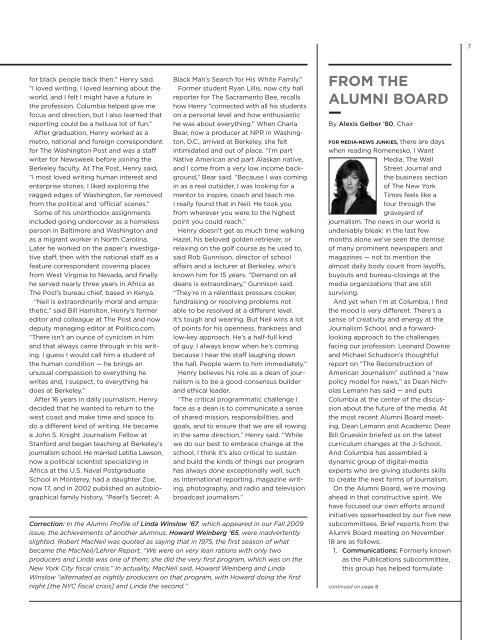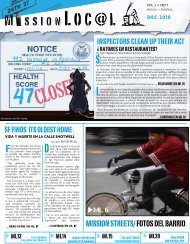Columbia Journalism sChool Winter 2010 - Berkeley Graduate ...
Columbia Journalism sChool Winter 2010 - Berkeley Graduate ...
Columbia Journalism sChool Winter 2010 - Berkeley Graduate ...
Create successful ePaper yourself
Turn your PDF publications into a flip-book with our unique Google optimized e-Paper software.
for black people back then,” Henry said.<br />
“I loved writing, I loved learning about the<br />
world, and I felt I might have a future in<br />
the profession. <strong>Columbia</strong> helped give me<br />
focus and direction, but I also learned that<br />
reporting could be a helluva lot of fun.”<br />
After graduation, Henry worked as a<br />
metro, national and foreign correspondent<br />
for The Washington Post and was a staff<br />
writer for Newsweek before joining the<br />
<strong>Berkeley</strong> faculty. At The Post, Henry said,<br />
“I most loved writing human interest and<br />
enterprise stories. I liked exploring the<br />
ragged edges of Washington, far removed<br />
from the political and ‘official’ scenes.”<br />
Some of his unorthodox assignments<br />
included going undercover as a homeless<br />
person in Baltimore and Washington and<br />
as a migrant worker in North Carolina.<br />
Later he worked on the paper’s investigative<br />
staff, then with the national staff as a<br />
feature correspondent covering places<br />
from West Virginia to Nevada, and finally<br />
he served nearly three years in Africa as<br />
The Post’s bureau chief, based in Kenya.<br />
“Neil is extraordinarily moral and empathetic,”<br />
said Bill Hamilton, Henry’s former<br />
editor and colleague at The Post and now<br />
deputy managing editor at Politico.com.<br />
“There isn’t an ounce of cynicism in him<br />
and that always came through in his writing.<br />
I guess I would call him a student of<br />
the human condition — he brings an<br />
unusual compassion to everything he<br />
writes and, I suspect, to everything he<br />
does at <strong>Berkeley</strong>.”<br />
After 16 years in daily journalism, Henry<br />
decided that he wanted to return to the<br />
west coast and make time and space to<br />
do a different kind of writing. He became<br />
a John S. Knight <strong>Journalism</strong> Fellow at<br />
Stanford and began teaching at <strong>Berkeley</strong>’s<br />
journalism school. He married Letitia Lawson,<br />
now a political scientist specializing in<br />
Africa at the U.S. Naval Postgraduate<br />
School in Monterey, had a daughter Zoe,<br />
now 17, and in 2002 published an autobiographical<br />
family history, “Pearl’s Secret: A<br />
Black Man’s Search for His White Family.”<br />
Former student Ryan Lillis, now city hall<br />
reporter for The Sacramento Bee, recalls<br />
how Henry “connected with all his students<br />
on a personal level and how enthusiastic<br />
he was about everything.” When Charla<br />
Bear, now a producer at NPR in Washington,<br />
D.C., arrived at <strong>Berkeley</strong>, she felt<br />
intimidated and out of place. “I’m part<br />
Native American and part Alaskan native,<br />
and I come from a very low income background,”<br />
Bear said. “Because I was coming<br />
in as a real outsider, I was looking for a<br />
mentor to inspire, coach and teach me.<br />
I really found that in Neil. He took you<br />
from wherever you were to the highest<br />
point you could reach.”<br />
Henry doesn’t get as much time walking<br />
Hazel, his beloved golden retriever, or<br />
relaxing on the golf course as he used to,<br />
said Rob Gunnison, director of school<br />
affairs and a lecturer at <strong>Berkeley</strong>, who’s<br />
known him for 15 years. “Demand on all<br />
deans is extraordinary,” Gunnison said.<br />
“They’re in a relentless pressure cooker,<br />
fundraising or resolving problems not<br />
able to be resolved at a different level.<br />
It’s tough and wearing. But Neil wins a lot<br />
of points for his openness, frankness and<br />
low-key approach. He’s a half-full kind<br />
of guy. I always know when he’s coming<br />
because I hear the staff laughing down<br />
the hall. People warm to him immediately.”<br />
Henry believes his role as a dean of journalism<br />
is to be a good consensus builder<br />
and ethical leader.<br />
“The critical programmatic challenge I<br />
face as a dean is to communicate a sense<br />
of shared mission, responsibilities, and<br />
goals, and to ensure that we are all rowing<br />
in the same direction,” Henry said. “While<br />
we do our best to embrace change at the<br />
school, I think it’s also critical to sustain<br />
and build the kinds of things our program<br />
has always done exceptionally well, such<br />
as international reporting, magazine writing,<br />
photography, and radio and television<br />
broadcast journalism.”<br />
Correction: In the Alumni Profile of Linda Winslow ’67, which appeared in our Fall 2009<br />
issue, the achievements of another alumnus, Howard Weinberg ’65, were inadvertently<br />
slighted. Robert MacNeil was quoted as saying that in 1975, the first season of what<br />
became the MacNeil/Lehrer Report, “We were on very lean rations with only two<br />
producers and Linda was one of them; she did the very first program, which was on the<br />
New York City fiscal crisis.” In actuality, MacNeil said, Howard Weinberg and Linda<br />
Winslow “alternated as nightly producers on that program, with Howard doing the first<br />
night [the NYC fiscal crisis] and Linda the second.”<br />
From The<br />
alumni BoarD<br />
—<br />
By Alexis Gelber ’80, Chair<br />
For meDia-neWS JunkieS, there are days<br />
when reading Romenesko, I Want<br />
Media, The Wall<br />
Street Journal and<br />
the business section<br />
of The New York<br />
Times feels like a<br />
tour through the<br />
graveyard of<br />
journalism. The news in our world is<br />
undeniably bleak: in the last few<br />
months alone we’ve seen the demise<br />
of many prominent newspapers and<br />
magazines — not to mention the<br />
almost daily body count from layoffs,<br />
buyouts and bureau-closings at the<br />
media organizations that are still<br />
surviving.<br />
And yet when I’m at <strong>Columbia</strong>, I find<br />
the mood is very different. There’s a<br />
sense of creativity and energy at the<br />
<strong>Journalism</strong> School, and a forwardlooking<br />
approach to the challenges<br />
facing our profession. Leonard Downie<br />
and Michael Schudson’s thoughtful<br />
report on “The Reconstruction of<br />
American <strong>Journalism</strong>” outlined a “new<br />
policy model for news,” as Dean Nicholas<br />
Lemann has said — and puts<br />
<strong>Columbia</strong> at the center of the discussion<br />
about the future of the media. At<br />
the most recent Alumni Board meeting,<br />
Dean Lemann and Academic Dean<br />
Bill Grueskin briefed us on the latest<br />
curriculum changes at the J-School.<br />
And <strong>Columbia</strong> has assembled a<br />
dynamic group of digital-media<br />
experts who are giving students skills<br />
to create the next forms of journalism.<br />
On the Alumni Board, we’re moving<br />
ahead in that constructive spirit. We<br />
have focused our own efforts around<br />
initiatives spearheaded by our five new<br />
subcommittees. Brief reports from the<br />
Alumni Board meeting on November<br />
18 are as follows:<br />
1. Communications: Formerly known<br />
as the Publications subcommittee,<br />
this group has helped formulate<br />
continued on page 8<br />
7



